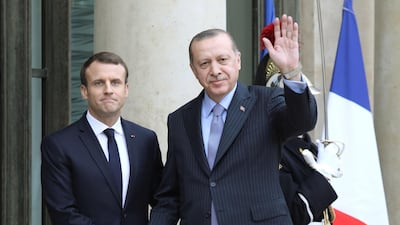The unseemly diplomatic spat Turkish President Recep Tayyip Erdogan has provoked with France needs to be seen in the context of his increasingly desperate attempt to position himself as the leader of the Islamist cause in the Middle East.
Trouble has been brewing between Mr Erdogan and French President Emmanuel Macron ever since the start of this year, when France announced it was providing military support to Greece and Cyprus in response to Turkey’s attempts to claim control over vast energy reserves in the eastern Mediterranean.
The French initiative, which raised the risk of a direct confrontation between two key allies of the Nato alliance, led to an incident between the French and Turkish navies in June when the French frigate Courbet tried to intercept a Tanzanian-flagged cargo ship, Cirkin, suspected of shipping arms to Libya's Islamist-backed Government of National Accord.
The French accused Turkish warships, which were escorting the cargo vessel, of targeting the Courbet three times with their weapons systems, prompting the French to withdraw from a Nato naval exercise in protest.
The incident reflected the mounting tensions between Paris and Ankara over Libya, where Turkey is providing military backing to the GNA and France is supporting the rival Libyan National Army. Turkey’s insistence on carrying out drilling operations in the eastern Mediterranean in the face of strong objections by Greece and Cyprus has been another, major source of contention between the two countries.
And more recently, Mr Erdogan has been irritated by France’s strong condemnation of his support for Azerbaijan during the latter’s recent flare-up with Armenia over a disputed region of the Caucasus. Mr Macron has denounced Turkey’s support for Azerbaijan as “bellicose”.
Mr Erdogan’s dramatic call for Muslim countries to boycott French products is, therefore, the Turkish leader’s way of getting back at Mr Macron at a time when the French president is struggling to deal with a wave of Islamist-inspired terror attacks in his own country.
Sensing an opportunity to exploit the domestic political pressure Mr Macron has been under, following the brutal beheading of a French schoolteacher by a Chechen terrorist earlier this month, Mr Erdogan decided to launch deeply personal insults at the French leader.
He began last weekend, after Mr Macron pledged to crack down on Islamist groups, by claiming that the French President required a “mental health check-up”.
The murdered teacher, Samuel Paty, was killed after showing to his students copies of offensive cartoons of the Prophet Mohammed which first appeared in the French satirical magazine Charlie Hebdo five years ago. Charlie Hebdo was itself was the target of a high profile attack by extremists later that year.
Apart from detaining members of the Chechen killer’s family and associates, the French authorities launched a nationwide clampdown against a number of extremist groups. They also closed down a pro-Hamas mosque in Paris that was accused of being “directly implicated” in the murder.
The decision to shut down the “Cheikh Yassine Collective,” named after the founder of the Gaza-based militant organisation, was taken after the group’s founder and extremist Abdelhakim Sefrioui was held held by police for publishing a video on YouTube insulting Paty.
The French clampdown against extremist groups prompted Mr Erdogan to accuse Mr Macron of Islamophobia, an accusation the French leader vehemently denied. But the Turkish leader’s decision to call for a boycott of French goods represents a dramatic escalation in the stand-off between Ankara and Paris – one that could have profound implications for France and its relationship with the parts of the Islamic world.
With fears mounting that Mr Erdogan’s boycott call could result in further acts of violence against France, Paris earlier this week urged its citizens to take extra security precautions in a string of Muslim-majority countries, including Indonesia, Bangladesh, Iraq and Mauritania.
And there were concerns that the Turkish leader’s provocative action could result in further terror attacks against French targets. On Thursday three people were killed and several others injured after a suspected terrorist knife attack at the Notre Dame church in Nice. The city’s Mayor, Christian Estrosi, said the attack appeared to be a terrorist incident.
In other suspected terrorism-related incidents, a guard was stabbed at a French consulate in Saudi Arabia, while a gunman was shot dead by French police in Avignon after threatening people with a handgun.
While it is unclear whether the latest upsurge in attacks, which took place on the Prophet Mohammed’s birthday, are directly related to Mr Erdogan’s confrontational approach to France, there can be little doubt that his action has increased tensions between France and the Islamic world. It also represents a blatant attempt by the Turkish leader to boost his credentials as the leader of the extremist Muslim Brotherhood.
In order to defuse the growing crisis over Mr Erdogan’s conduct, it is therefore vital that the rest of the world sees the Turkish’s leader’s action as nothing more than opportunistic grandstanding.
Although Mr Macron has inflamed emotions with his disregard for the offence the cartoon causes, taking a stand against acts of terrorism does not amount to Islamophobia, a fact that needs to be given serious consideration if Mr Erdogan’s provocative action is to be prevented from causing further unnecessary bloodshed.
Con Coughlin is a defence and foreign affairs columnist for The National


